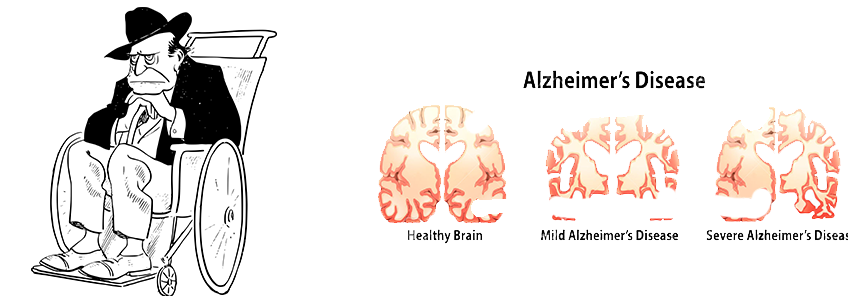Alzheimer’s Disease

- Increasing age: rare before age of 65
- Family history: you are high risk for alzheimer if your first degree relative has alzheimer’s
- Being female: partly because they live longer
- Head injury and cognitive impairment
- Risk factors associated with heart disease ( hypertension, diabetes mellitus, obesity, hyperlipidemia) also seem to increase the risk of alzheimer’s
- Genetics: APOE 4 genotype is considered a high risk gene.
- Down syndrome: people with this disorder develop Alzheimer’s 10-20 years earlier.
- Forgetting important dates; asking the same questions again and again; needing to use reminder aids or rely on others to do things you used to take care of yourself.
- Confusion with location, dates, and time
- Putting things in very unusual places and not finding them
- Poor judgement, such as giving a large sum of money to scammers
- Withdrawing from social activities, such as following your favorite sports team or hobby
- Changing mood and personality, such as becoming afraid, confused, depressed, or suspicious
- Perceptual-motor problems: Such as trouble getting out of a chair or setting the table
Alzheimer’s disease is a disorder of brain function where you experience a gradual and progressive decline in your memory along with other intellectual function of the brain. The rate with which the disease progresses varies between people to people. They also develop problems related to thinking, social behavior and personality. Eventually, people forget most of the important things from their life and are unable to perform basic activities of life like dressing, eating and bathing.
Causes
The cause of Alzheimer’s disease is not fully understood. A combination of genetic, environmental and lifestyle factors are thought to play a role in the disease process. What is clear though is that brain cell die in larger numbers and brain shrinks in size Alzheimer’s disease.
Risk Factors
The risk factors that predispose to Alzheimer’s disease could be:
Symptoms
Alzheimer’s disease begins with memory loss. You may or may not notice the early subtle signs of difficulty remembering things but your family may notice it.
Some of the examples of memory impairment and challenges of perception and judgment include:
Diagnosis
There is no test that can tell you with certainty that you have Alzheimer’s except a microscopic examination of the brain after a person dies. The doctor will make a diagnosis of Alzheimer’s disease based on your symptoms and a physical and neuropsychological examination. The doctor may perform other test like blood test, MRI, CT ,EEG and PET scans to rule out other causes of memory loss. The testing of brain activity through EEG is also done as required. Genetic testing are not routinely indicated except for cases with early onset memory loss.
Treatment
There is no cure for Alzheimer’s disease. Medical treatment can help manage memory loss and other brain function symptoms. Non medical treatments like regular physical exercise, engagement in social and intellectual activities can slow down the progression of the disease.
Prevention
Certain lifestyle factors are thought to reduce the risk of getting alzheimer’s disease. Increasing social engagement and participation in intellectually stimulating activities may preserve brain function. Similarly, regular physical exercise specially geared towards cardiovascular health may prevent mental decline. A healthy diet low in fat and rich in fruits and vegetables is suggested to reduce the risk of developing Alzheimer’s disease. A mediterranean diet is thought to be of significant value in preventing Alzheimer’s disease.



Send us your feedback on this article